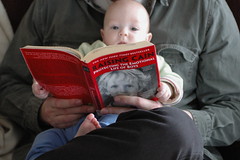there’s nothing quite like having an infant son to focus one’s mind on weighty questions, such as what it means to be a boy today? the statistics tell part of the unsettling story and there’s a growing cadre of theorists who theorize that if you’re looking for root causes as to why boys under the age of 18 are responsible for about one-fifth of the violent crime in the u.s., one might look towards how they are taught to express their emotions and relate to others.
why is is that, even today, when evidence exists that newborn boys are generally more emotionally expressive than girls, evidence also seems to indicate that although 2nd grade boys are more emotionally stressed when listening to a crying baby, they’re less capable in handling their emotions and attempt to avoid the source of the emotional conflict? ( for now, we’ll just assume that’s factual since it’s cited in the statistics , but no attribution is given for source research. )
raising cain was first published in 1999 and , according the publisher, “…through moving case studies and cutting-edge research Raising Cain paints a portrait of boys systematically steered away from their emotional lives by adults and the peer “culture of cruelty”–boys who receive little encouragement to develop qualities such as compassion, sensitivity, and warmth.”
i’m not going to really argue with the merits of the assumptions of the book, with regards to the emotional depths that your average man is capable of reaching and how that might be related to early parental and societal conditioning. i think it’s probably safe to say that while it might not be the only root cause of the effects , it’s still probably an area of focus which is amenable to much improvement.
i guess whether or not “raising cain” is successful providing remedies to the situation depends on whether or not you think that advice like, “teach your boys that there are many ways to be a man” is really that insightful. and even if there was a modicum of insight in the platitude, what exactly does it mean and how does one actually teach it in a world that doesn’t really reinforce the principle?
i mean, what would we do if we succeeded in nurturing the most sensitive and empathetic of boys, only discover that he’s had his nose broken on the playground because word got out that he wanted to play dorothy in the wizard of oz?
unrelatedly ( and it might be an overly unfair nit), it appears that “raising cain” and many other books in this genre were written soon after the wildly successful “reviving ophelia” and i can’t help but think that “raising cain” was slapdashed together after the pitch was made to the publisher, “you know it’ll be like ‘reviving ophelia’, but for boys, now if we can just find a psychologist or two to fill it with ‘moving case studies’…”;
so, in the end, “raising cain” does an adequate job of raising important issues, but i certainly wouldn’t consider it the final word on the topic.
more…
Boys to men: emotional miseducation
The Focus Shifts to Raising Boys
raising our sons
the emotional life of boys
The Wonder of Boys
